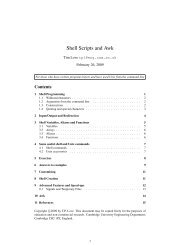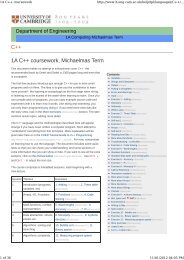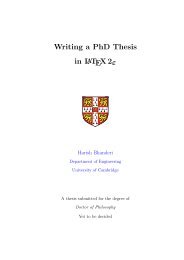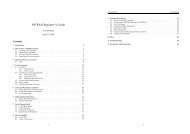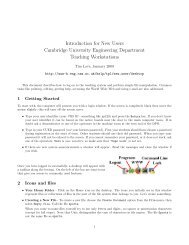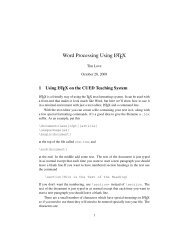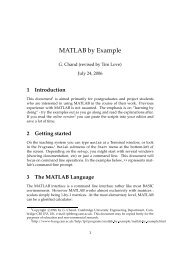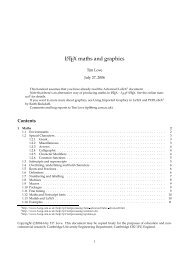- Page 1 and 2:
Intel ® FortranLibraries Reference
- Page 3 and 4:
ContentsAbout This ManualProduct We
- Page 5 and 6:
ContentsCOMMITQQ...................
- Page 7 and 8:
ContentsGETDRIVESIZEQQ.............
- Page 9 and 10:
ContentsISATTY.....................
- Page 11 and 12:
ContentsPXFCFGETISPEED ............
- Page 13 and 14:
ContentsPXFPUTC ...................
- Page 15 and 16:
ContentsSCROLLTEXTWINDOW ..........
- Page 17 and 18:
ContentsSSWRQQ ....................
- Page 19 and 20:
About This ManualThis manual descri
- Page 21 and 22:
About This ManualAssociated Intel D
- Page 23 and 24:
About This ManualCTRL{choice1 | cho
- Page 25 and 26:
About This ManualPlatformLanguage O
- Page 27 and 28:
Overview of the Libraries 1This cha
- Page 29 and 30:
Overview of the Libraries 1Table 1-
- Page 31 and 32:
Overview of the Libraries 1Table 1-
- Page 33 and 34:
Overview of the Libraries 1Table 1-
- Page 35 and 36:
Overview of the Libraries 1Table 1-
- Page 37 and 38:
Overview of the Libraries 1TimeThe
- Page 39 and 40:
Overview of the Libraries 1Table 1-
- Page 41 and 42:
Overview of the Libraries 1Table 1-
- Page 43 and 44:
Overview of the Libraries 1Table 1-
- Page 45 and 46:
Overview of the Libraries 1Table 1-
- Page 47 and 48:
Overview of the Libraries 1Table 1-
- Page 49 and 50:
Overview of the Libraries 1Table 1-
- Page 51 and 52:
Overview of the Libraries 1Table 1-
- Page 53 and 54:
Descriptions of the LibraryRoutines
- Page 55 and 56:
Descriptions of the Library Routine
- Page 57 and 58:
Descriptions of the Library Routine
- Page 59 and 60:
Descriptions of the Library Routine
- Page 61 and 62:
Descriptions of the Library Routine
- Page 63 and 64:
Descriptions of the Library Routine
- Page 65 and 66:
Descriptions of the Library Routine
- Page 67 and 68:
Descriptions of the Library Routine
- Page 69 and 70:
Descriptions of the Library Routine
- Page 71 and 72:
Descriptions of the Library Routine
- Page 73 and 74:
Descriptions of the Library Routine
- Page 76 and 77:
2 Intel Fortran Libraries Reference
- Page 79 and 80:
Descriptions of the Library Routine
- Page 82 and 83:
2 Intel Fortran Libraries Reference
- Page 84 and 85:
2 Intel Fortran Libraries Reference
- Page 86 and 87:
2 Intel Fortran Libraries Reference
- Page 88 and 89:
2 Intel Fortran Libraries Reference
- Page 90 and 91:
2 Intel Fortran Libraries Reference
- Page 92 and 93:
2 Intel Fortran Libraries Reference
- Page 94 and 95:
2 Intel Fortran Libraries Reference
- Page 96:
2 Intel Fortran Libraries Reference
- Page 100 and 101:
2 Intel Fortran Libraries Reference
- Page 102 and 103:
2 Intel Fortran Libraries Reference
- Page 104 and 105:
2 Intel Fortran Libraries Reference
- Page 106 and 107:
2 Intel Fortran Libraries Reference
- Page 108 and 109:
2 Intel Fortran Libraries Reference
- Page 110 and 111:
2 Intel Fortran Libraries Reference
- Page 112 and 113:
2 Intel Fortran Libraries Reference
- Page 114 and 115:
2 Intel Fortran Libraries Reference
- Page 116 and 117:
2 Intel Fortran Libraries Reference
- Page 118 and 119:
2 Intel Fortran Libraries Reference
- Page 120 and 121:
2 Intel Fortran Libraries Reference
- Page 122 and 123:
2 Intel Fortran Libraries Reference
- Page 124 and 125:
2 Intel Fortran Libraries Reference
- Page 126 and 127:
2 Intel Fortran Libraries Reference
- Page 128 and 129:
2 Intel Fortran Libraries Reference
- Page 130 and 131:
2 Intel Fortran Libraries Reference
- Page 132 and 133:
2 Intel Fortran Libraries Reference
- Page 134 and 135:
2 Intel Fortran Libraries Reference
- Page 136 and 137:
2 Intel Fortran Libraries Reference
- Page 138 and 139:
2 Intel Fortran Libraries Reference
- Page 140 and 141:
2 Intel Fortran Libraries Reference
- Page 142 and 143:
2 Intel Fortran Libraries Reference
- Page 144 and 145:
2 Intel Fortran Libraries Reference
- Page 146 and 147:
2 Intel Fortran Libraries Reference
- Page 148 and 149:
2 Intel Fortran Libraries Reference
- Page 150 and 151:
2 Intel Fortran Libraries Reference
- Page 152 and 153:
2 Intel Fortran Libraries Reference
- Page 154 and 155:
2 Intel Fortran Libraries Reference
- Page 156 and 157:
2 Intel Fortran Libraries Reference
- Page 158 and 159:
2 Intel Fortran Libraries Reference
- Page 160 and 161:
2 Intel Fortran Libraries Reference
- Page 162 and 163:
2 Intel Fortran Libraries Reference
- Page 164 and 165:
2 Intel Fortran Libraries Reference
- Page 166 and 167:
2 Intel Fortran Libraries Reference
- Page 168 and 169:
2 Intel Fortran Libraries Reference
- Page 170 and 171:
2 Intel Fortran Libraries Reference
- Page 172 and 173:
2 Intel Fortran Libraries Reference
- Page 174 and 175:
2 Intel Fortran Libraries Reference
- Page 176 and 177:
2 Intel Fortran Libraries Reference
- Page 178 and 179:
2 Intel Fortran Libraries Reference
- Page 180 and 181:
2 Intel Fortran Libraries Reference
- Page 182 and 183:
2 Intel Fortran Libraries Reference
- Page 184 and 185:
2 Intel Fortran Libraries Reference
- Page 186 and 187:
2 Intel Fortran Libraries Reference
- Page 188 and 189:
2 Intel Fortran Libraries Reference
- Page 190 and 191:
2 Intel Fortran Libraries Reference
- Page 192 and 193:
2 Intel Fortran Libraries Reference
- Page 194 and 195:
2 Intel Fortran Libraries Reference
- Page 196 and 197:
2 Intel Fortran Libraries Reference
- Page 198 and 199:
2 Intel Fortran Libraries Reference
- Page 200 and 201:
2 Intel Fortran Libraries Reference
- Page 202 and 203:
2 Intel Fortran Libraries Reference
- Page 204 and 205:
2 Intel Fortran Libraries Reference
- Page 206 and 207:
2 Intel Fortran Libraries Reference
- Page 208 and 209:
2 Intel Fortran Libraries Reference
- Page 210 and 211:
2 Intel Fortran Libraries Reference
- Page 212 and 213:
2 Intel Fortran Libraries Reference
- Page 214 and 215:
2 Intel Fortran Libraries Reference
- Page 216 and 217:
2 Intel Fortran Libraries Reference
- Page 218 and 219:
2 Intel Fortran Libraries Reference
- Page 220 and 221:
2 Intel Fortran Libraries Reference
- Page 222 and 223:
2 Intel Fortran Libraries Reference
- Page 224 and 225:
2 Intel Fortran Libraries Reference
- Page 226 and 227:
2 Intel Fortran Libraries Reference
- Page 228 and 229:
2 Intel Fortran Libraries Reference
- Page 230 and 231:
2 Intel Fortran Libraries Reference
- Page 232 and 233:
2 Intel Fortran Libraries Reference
- Page 234 and 235:
2 Intel Fortran Libraries Reference
- Page 236 and 237:
2 Intel Fortran Libraries Reference
- Page 238 and 239:
2 Intel Fortran Libraries Reference
- Page 240 and 241:
2 Intel Fortran Libraries Reference
- Page 242 and 243:
2 Intel Fortran Libraries Reference
- Page 244 and 245:
2 Intel Fortran Libraries Reference
- Page 246 and 247:
2 Intel Fortran Libraries Reference
- Page 248 and 249:
2 Intel Fortran Libraries Reference
- Page 250 and 251:
2 Intel Fortran Libraries Reference
- Page 252 and 253:
2 Intel Fortran Libraries Reference
- Page 254 and 255:
2 Intel Fortran Libraries Reference
- Page 256 and 257:
2 Intel Fortran Libraries Reference
- Page 258 and 259:
2 Intel Fortran Libraries Reference
- Page 260 and 261:
2 Intel Fortran Libraries Reference
- Page 262 and 263:
2 Intel Fortran Libraries Reference
- Page 264 and 265:
2 Intel Fortran Libraries Reference
- Page 266 and 267:
2 Intel Fortran Libraries Reference
- Page 268 and 269:
2 Intel Fortran Libraries Reference
- Page 270 and 271:
2 Intel Fortran Libraries Reference
- Page 272 and 273:
2 Intel Fortran Libraries Reference
- Page 274 and 275:
2 Intel Fortran Libraries Reference
- Page 276 and 277:
2 Intel Fortran Libraries Reference
- Page 278 and 279:
2 Intel Fortran Libraries Reference
- Page 280 and 281:
2 Intel Fortran Libraries Reference
- Page 282 and 283:
2 Intel Fortran Libraries Reference
- Page 284 and 285:
2 Intel Fortran Libraries Reference
- Page 286 and 287:
2 Intel Fortran Libraries Reference
- Page 288 and 289:
2 Intel Fortran Libraries Reference
- Page 290 and 291:
2 Intel Fortran Libraries Reference
- Page 292 and 293:
2 Intel Fortran Libraries Reference
- Page 294 and 295:
2 Intel Fortran Libraries Reference
- Page 296 and 297:
2 Intel Fortran Libraries Reference
- Page 298 and 299:
2 Intel Fortran Libraries Reference
- Page 300 and 301:
2 Intel Fortran Libraries Reference
- Page 302 and 303:
2 Intel Fortran Libraries Reference
- Page 304 and 305:
2 Intel Fortran Libraries Reference
- Page 306 and 307:
2 Intel Fortran Libraries Reference
- Page 308 and 309:
2 Intel Fortran Libraries Reference
- Page 310 and 311:
2 Intel Fortran Libraries Reference
- Page 312 and 313:
2 Intel Fortran Libraries Reference
- Page 314 and 315:
2 Intel Fortran Libraries Reference
- Page 316 and 317:
2 Intel Fortran Libraries Reference
- Page 318 and 319:
2 Intel Fortran Libraries Reference
- Page 320 and 321:
2 Intel Fortran Libraries Reference
- Page 322 and 323:
2 Intel Fortran Libraries Reference
- Page 324 and 325:
2 Intel Fortran Libraries Reference
- Page 326 and 327:
2 Intel Fortran Libraries Reference
- Page 328 and 329:
2 Intel Fortran Libraries Reference
- Page 330 and 331:
2 Intel Fortran Libraries Reference
- Page 332 and 333:
2 Intel Fortran Libraries Reference
- Page 334 and 335:
2 Intel Fortran Libraries Reference
- Page 336 and 337:
2 Intel Fortran Libraries Reference
- Page 338 and 339:
2 Intel Fortran Libraries Reference
- Page 340 and 341:
2 Intel Fortran Libraries Reference
- Page 342 and 343:
2 Intel Fortran Libraries Reference
- Page 344 and 345:
2 Intel Fortran Libraries Reference
- Page 346 and 347:
2 Intel Fortran Libraries Reference
- Page 348 and 349:
2 Intel Fortran Libraries Reference
- Page 350 and 351:
2 Intel Fortran Libraries Reference
- Page 352 and 353:
2 Intel Fortran Libraries Reference
- Page 354 and 355:
2 Intel Fortran Libraries Reference
- Page 356 and 357:
2 Intel Fortran Libraries Reference
- Page 358 and 359:
2 Intel Fortran Libraries Reference
- Page 360 and 361:
2 Intel Fortran Libraries Reference
- Page 362 and 363:
2 Intel Fortran Libraries Reference
- Page 364 and 365:
2 Intel Fortran Libraries Reference
- Page 366 and 367:
2 Intel Fortran Libraries Reference
- Page 368 and 369:
2 Intel Fortran Libraries Reference
- Page 370 and 371:
2 Intel Fortran Libraries Reference
- Page 372 and 373:
2 Intel Fortran Libraries Reference
- Page 374 and 375:
2 Intel Fortran Libraries Reference
- Page 376 and 377:
2 Intel Fortran Libraries Reference
- Page 378 and 379:
2 Intel Fortran Libraries Reference
- Page 380 and 381:
2 Intel Fortran Libraries Reference
- Page 382 and 383:
2 Intel Fortran Libraries Reference
- Page 384 and 385:
2 Intel Fortran Libraries Reference
- Page 386 and 387:
2 Intel Fortran Libraries Reference
- Page 388 and 389:
2 Intel Fortran Libraries Reference
- Page 390 and 391:
2 Intel Fortran Libraries Reference
- Page 392 and 393:
2 Intel Fortran Libraries Reference
- Page 394 and 395:
2 Intel Fortran Libraries Reference
- Page 396 and 397:
2 Intel Fortran Libraries Reference
- Page 398 and 399:
2 Intel Fortran Libraries Reference
- Page 400 and 401: 2 Intel Fortran Libraries Reference
- Page 402 and 403: 2 Intel Fortran Libraries Reference
- Page 404 and 405: 2 Intel Fortran Libraries Reference
- Page 406 and 407: 2 Intel Fortran Libraries Reference
- Page 408 and 409: 2 Intel Fortran Libraries Reference
- Page 410 and 411: 2 Intel Fortran Libraries Reference
- Page 412 and 413: 2 Intel Fortran Libraries Reference
- Page 414 and 415: 2 Intel Fortran Libraries Reference
- Page 416 and 417: 2 Intel Fortran Libraries Reference
- Page 418 and 419: 2 Intel Fortran Libraries Reference
- Page 420 and 421: 2 Intel Fortran Libraries Reference
- Page 422 and 423: 2 Intel Fortran Libraries Reference
- Page 424 and 425: 2 Intel Fortran Libraries Reference
- Page 426 and 427: 2 Intel Fortran Libraries Reference
- Page 428 and 429: 2 Intel Fortran Libraries Reference
- Page 430 and 431: 2 Intel Fortran Libraries Reference
- Page 432 and 433: 2 Intel Fortran Libraries Reference
- Page 434 and 435: 2 Intel Fortran Libraries Reference
- Page 436 and 437: 2 Intel Fortran Libraries Reference
- Page 438 and 439: 2 Intel Fortran Libraries Reference
- Page 440 and 441: 2 Intel Fortran Libraries Reference
- Page 442 and 443: 2 Intel Fortran Libraries Reference
- Page 444 and 445: 2 Intel Fortran Libraries Reference
- Page 446 and 447: 2 Intel Fortran Libraries Reference
- Page 448 and 449: 2 Intel Fortran Libraries Reference
- Page 452 and 453: 2 Intel Fortran Libraries Reference
- Page 454 and 455: 2 Intel Fortran Libraries Reference
- Page 456 and 457: 2 Intel Fortran Libraries Reference
- Page 458 and 459: 2 Intel Fortran Libraries Reference
- Page 460 and 461: 2 Intel Fortran Libraries Reference
- Page 462 and 463: 2 Intel Fortran Libraries Reference
- Page 464 and 465: 2 Intel Fortran Libraries Reference
- Page 466 and 467: 2 Intel Fortran Libraries Reference
- Page 468 and 469: 2 Intel Fortran Libraries Reference
- Page 470 and 471: 2 Intel Fortran Libraries Reference
- Page 472 and 473: 2 Intel Fortran Libraries Reference
- Page 474 and 475: 2 Intel Fortran Libraries Reference
- Page 476 and 477: 2 Intel Fortran Libraries Reference
- Page 478 and 479: 2 Intel Fortran Libraries Reference
- Page 480 and 481: 2 Intel Fortran Libraries Reference
- Page 482 and 483: 2 Intel Fortran Libraries Reference
- Page 484 and 485: 2 Intel Fortran Libraries Reference
- Page 486 and 487: 2 Intel Fortran Libraries Reference
- Page 488 and 489: 2 Intel Fortran Libraries Reference
- Page 490 and 491: 2 Intel Fortran Libraries Reference
- Page 492 and 493: 2 Intel Fortran Libraries Reference
- Page 494 and 495: 2 Intel Fortran Libraries Reference
- Page 496 and 497: 2 Intel Fortran Libraries Reference
- Page 498 and 499: 2 Intel Fortran Libraries Reference
- Page 500 and 501:
2 Intel Fortran Libraries Reference
- Page 502 and 503:
2 Intel Fortran Libraries Reference
- Page 504 and 505:
2 Intel Fortran Libraries Reference
- Page 506 and 507:
2 Intel Fortran Libraries Reference
- Page 508 and 509:
2 Intel Fortran Libraries Reference
- Page 510 and 511:
2 Intel Fortran Libraries Reference
- Page 512 and 513:
2 Intel Fortran Libraries Reference
- Page 514 and 515:
2 Intel Fortran Libraries Reference
- Page 516 and 517:
2 Intel Fortran Libraries Reference
- Page 518 and 519:
2 Intel Fortran Libraries Reference
- Page 520 and 521:
2 Intel Fortran Libraries Reference
- Page 522 and 523:
2 Intel Fortran Libraries Reference
- Page 524 and 525:
2 Intel Fortran Libraries Reference
- Page 526 and 527:
2 Intel Fortran Libraries Reference
- Page 528 and 529:
2 Intel Fortran Libraries Reference
- Page 530 and 531:
2 Intel Fortran Libraries Reference
- Page 532 and 533:
2 Intel Fortran Libraries Reference
- Page 534 and 535:
2 Intel Fortran Libraries Reference
- Page 536 and 537:
2 Intel Fortran Libraries Reference
- Page 538 and 539:
2 Intel Fortran Libraries Reference
- Page 540 and 541:
2 Intel Fortran Libraries Reference
- Page 542 and 543:
2 Intel Fortran Libraries Reference
- Page 544 and 545:
2 Intel Fortran Libraries Reference
- Page 546 and 547:
Intel Fortran Libraries ReferenceAU
- Page 548 and 549:
Intel Fortran Libraries ReferenceCo
- Page 550 and 551:
Intel Fortran Libraries ReferenceDD
- Page 552 and 553:
Intel Fortran Libraries Referencefu
- Page 554 and 555:
Intel Fortran Libraries ReferenceFO
- Page 556 and 557:
Intel Fortran Libraries ReferenceGE
- Page 558 and 559:
Intel Fortran Libraries Referenceex
- Page 560 and 561:
Intel Fortran Libraries ReferenceLT
- Page 562 and 563:
Intel Fortran Libraries ReferenceNL
- Page 564 and 565:
Intel Fortran Libraries Referencefo
- Page 566 and 567:
Intel Fortran Libraries ReferencePX
- Page 568 and 569:
Intel Fortran Libraries ReferencePX
- Page 570 and 571:
Intel Fortran Libraries ReferencePX
- Page 572 and 573:
Intel Fortran Libraries ReferenceRG
- Page 574 and 575:
Intel Fortran Libraries ReferenceSE
- Page 576 and 577:
Intel Fortran Libraries ReferenceSy
- Page 578 and 579:
Intel Fortran Libraries ReferenceWi
- Page 580:
Intel Fortran Libraries ReferenceIn



